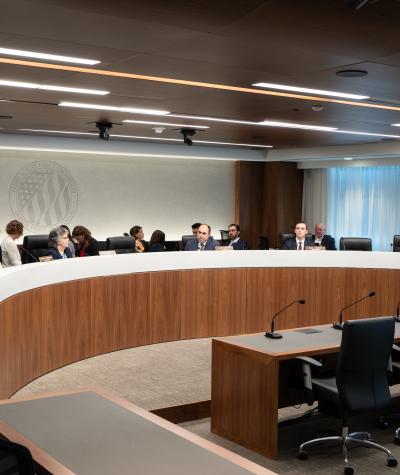CLC Action has filed suit on behalf of Common Cause Georgia against the Federal Election Commission (FEC) for failing to enforce key pieces of federal election law against the organization True the Vote and the Georgia Republican Party.
In the leadup to the 2021 runoff elections for U.S. Senate in Georgia, True the Vote — a national nonprofit corporation that describes itself as focused on “election integrity”— announced that it had received a “request from the Georgia Republican Party” for assistance with signature verification, ballot drop box monitoring, and other election-related activities.
The same day, True the Vote announced in a press release its “partnership with the Georgia Republican Party to assist with the Senate runoff election process.” The press release also quoted Georgia Republican Party Chairman David Shafer noting that the party was “grateful for the help of the True the Vote team in the fight for election integrity.” Three days after announcing its partnership with the Georgia GOP, True the Vote challenged the eligibility of more than 360,000 Georgia voters.
The Federal Election Campaign Act (FECA) prohibits contributions — including in-kind contributions in the form of coordinated expenditures — from a corporation like True the Vote to a party committee. The Georgia GOP did not disclose any contributions from True the Vote or payments made to True the Vote for its services.
In the past, many organizations and party committees have engaged in subtle efforts to circumvent campaign finance law. The public statements and obvious coordination documented in the administrative complaint filed by Common Cause Georgia and CLCA represent a new, more aggressive disregard for the laws intended to protect elections and keep voters informed about who is spending money to influence their ability to vote.
On March 31, 2021, in response to these actions by True the Vote and the Georgia GOP, CLC Action and Common Cause Georgia filed an administrative complaint with the FEC. The complaint alleged that True the Vote violated FECA by making these prohibited in-kind contributions to the Georgia GOP, and the Georgia GOP violated FECA by accepting these contributions and failing to report them.
In response to the complaint, the nonpartisan career lawyers in the FEC’s Office of General Counsel issued a detailed report analyzing the facts and recommending that the FEC find “reason to believe” that True the Vote and the Georgia GOP violated FECA and recommending an investigation to determine the extent and nature of the illegal and undisclosed contributions stemming from the groups’ coordinated efforts.
Despite this recommendation and the compelling evidence underlying it, the FEC failed to muster the four votes necessary to move forward with an investigation, and the complaint was dismissed on August 11, 2022.
Two of the Commissioners who voted to dismiss the complaint provided their reasoning in a statement that does not stand up to legal scrutiny. They claimed, among other things, that True the Vote’s activities, including the trainings, hotlines, and actions challenging the eligibility of hundreds of thousands of Georgia voters, were not undertaken “for the purpose of influencing an election,” and thus were not covered by FECA.
The Commissioners voting to dismiss the complaint also stated that True the Vote’s activities were not “coordinated” with the Georgia GOP because True the Vote would have done them anyway and because True the Vote’s use of “partnership” to describe the relationship was “colloquial” rather than legal.
However, the evidence made clear that True the Vote’s activities were indeed undertaken to influence the Georgia runoff election. And by the groups’ express admission, these activities were conducted at the “request” of and in “partnership” with the Georgia GOP.
The reasoning in the statement by the two Commissioners is contrary to law and would render the important protections in FECA meaningless if allowed to stand. CLC Action has now brought a lawsuit on behalf of Common Cause Georgia to challenge the FEC’s dismissal of the complaint against True the Vote and the Georgia GOP on these grounds.
This suit, filed on October 10, 2022, is about ensuring that the FEC properly enforces the law, and does not allow political parties to coordinate on election-related expenditures with supposedly “independent” corporate entities without paying for those services or disclosing them as in-kind contributions.
Georgia voters have a right to know who is spending money to influence their elections, and the American people deserve an FEC that can enforce campaign finance laws and hold violators of election law accountable.

